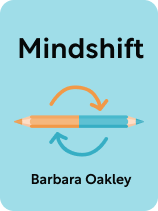

This article is an excerpt from the Shortform book guide to "Mindshift" by Barbara Oakley. Shortform has the world's best summaries and analyses of books you should be reading.
Like this article? Sign up for a free trial here.
Do you believe you can reinvent yourself at this point in your career? Do you think it’s too late to make a career change?
Barbara Oakley believes you’re capable of having a mindshift. This opens up career opportunities for you that you didn’t have before. But, before you can open up opportunities, you must open up your mind to possibilities.
Read on to learn about the importance of being open-minded in the context of your career and ability.
The Importance of Being Open-Minded
Whether you’re unhappy at work, interested in another field, or worried your job will become obsolete, it’s never too late to make a career change. Barbara Oakley asserts that, whatever your age or occupation, you can have a mindshift. This means opening up new opportunities through transformative learning. In Mindshift, she writes that it’s possible to overcome perceived barriers—such as age, imposter syndrome, or a lack of money—and gain new skills so you can reinvent yourself. She discusses the importance of being open-minded in this context.
Mindshifts are important for two reasons. First, Oakley asserts that they allow us to reach our full potential. Often, we’re forced to choose a career path at an early age, when we still don’t have a real sense of who we are or what we want to do. Having a mindshift allows us to diverge from a path we set as teenagers and become more than we thought we could be.
(Shortform note: It’s normal to be wistful about career paths not taken. In one survey, 21% of respondents said they often thought about other careers they could have explored, which prevented them from staying engaged at work. If a career change isn’t currently an option, you can stop ruminating on the “what ifs” by reminding yourself why you chose the path you’re on and reflecting on the good things about it.)
Second, Oakley argues that mindshifts allow us to enhance or gain skills so we can keep up with a fast-changing world. With technology developing at breakneck speed, our roles at work are constantly evolving and requiring us to adapt. Mindshifts give us more versatility and enable us to provide more value to employers, future-proofing our careers. For example, as more companies use chatbots and voicebots to field customer inquiries, human customer service agents who are worried about job security would benefit from having a mindshift.
(Shortform note: The rise of artificial intelligence (AI) has led to fears of a “jobs apocalypse.” However, some experts say that we’re still a long way from mass-replacing humans with robots. This is because companies tend to be slow to adopt new “smart” equipment, preferring to stick to old but reliable machines and cheap outsourced labor. If you’re still concerned about job security, consider a job in AI—there’s a rising demand for workers in fields such as machine learning, data science, process re-engineering, and data ethics. In other words, if you can’t beat ’em, join ’em.)
Oakley cites Singapore as a prime example of a country that recognizes the importance of giving its workforce career flexibility. Under the SkillsFuture program, the Singapore government gives a S$500 credit (roughly US$375 as of May 2023) to citizens who are 25 years old and above, with the amount going toward any training they wish to pursue. This enables the workforce to enhance existing skills to help them move forward in their careers or acquire new skills that will prepare them for a new field.
(Shortform note: The SkillsFuture program aids not just citizens 25 and above but everyone from students to early- and mid-career workers—and it does so with great success. In a 2019 survey by the Singapore Ministry of Education, nearly 80% of employers said that SkillsFuture training enabled employees to progress in their careers and helped companies retain valuable employees.)
Exercise: Practice Being More Open-Minded
Oakley says that having a mindshift includes realizing the value of your experience and figuring out what you want to do next.
- What is your current career? What are the skills that you’ve gained in this career?
- What other career are you interested in exploring? Oakley says you can shift to a completely different career or to something that’s still within your current field.
- How can the skills you honed in your current career be useful in your desired career?

———End of Preview———
Like what you just read? Read the rest of the world's best book summary and analysis of Barbara Oakley's "Mindshift" at Shortform.
Here's what you'll find in our full Mindshift summary:
- That it's never too late to make a career change
- How to overcome the mental barriers that hold you back
- Why career shifts are essential in the fast-changing world






